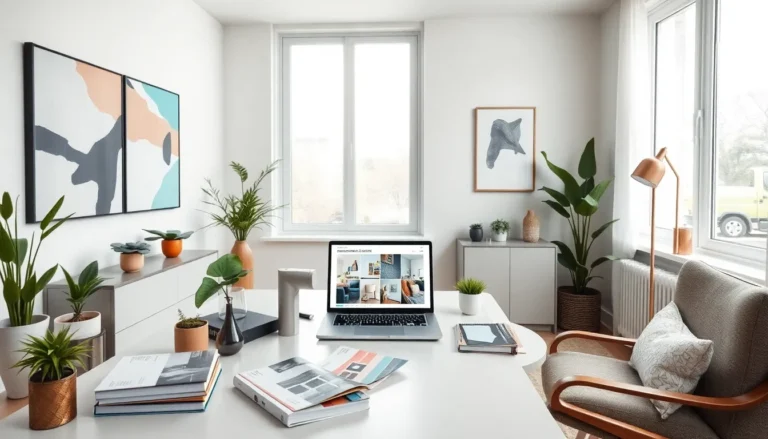Interior decorator school might just be the ticket to transforming a blank canvas into a masterpiece. Ever strolled into a room and thought, “Wow, this space really speaks to me?” That’s the power of skillful decorating. In a world brimming with dull beige walls and mismatched furniture, interior decorators emerge like superheroes wielding color palettes and fabric swatches. This guide will unravel what interior decorating is all about, explore career opportunities, and help aspiring decorators choose the right training path, because let’s be honest, who wouldn’t want to spend their days surrounded by stunning designs?
Table of Contents
ToggleUnderstanding Interior Decorating

What Is Interior Decorating?
Interior decorating involves transforming spaces to make them both functional and aesthetically pleasing. Think of it as giving rooms an extreme makeover, without the camera crew. It’s all about creating environments that resonate with the inhabitants while reflecting their personalities and preferences. From selecting color schemes to choosing furniture arrangements, every detail matters.
The Role of an Interior Decorator
An interior decorator does more than just play with colors. They analyze a space, understand their client’s vision, and create a cohesive look. Their tasks can range from simple rearrangement to extensive renovations, depending on the project. Decorators also collaborate closely with contractors, architects, and other professionals, ensuring that everything aligns beautifully.
Why Choose Interior Decorating as a Career?
Skills Required for Success
To thrive as an interior decorator, a blend of creativity, organization, and communication skills is essential. Decorators must understand not only the visual aspects but also the functional elements of design. This dynamic field requires adaptability to trends and an eagerness to learn continuously.
Creativity and Aesthetic Sense
Undoubtedly, a keen eye for design is crucial. Seeing potential in a barren space sets great decorators apart. They tap into their creativity, embracing color theory, balance, and proportion to evoke specific feelings in the viewer. A successful decorator turns conformity on its head, curating unique designs that challenge the mundane.
Technical Skills in Decorating
Besides creativity, technical skills cannot be overlooked. Understanding design software, architectural principles, and even basic construction knowledge can give decorators an edge. Being proficient in tools and technologies plays a vital role in executing innovative ideas effectively.
Choosing the Right Interior Decorator School
Accreditation and Reputation
When selecting an interior decorator school, accredited programs lend credibility and assurance. It’s wise to prioritize reputable institutions known for their quality education. Credible schools equip students with critical knowledge and provide networking opportunities with industry veterans.
Curriculum and Course Offerings
Look beyond general decor courses: institutions should offer specialized programs that encompass varied aspects of interior design. Topics like color theory, spatial arrangements, and advanced digital design techniques are crucial. Varied offerings equip students for diverse challenges they’ll face in their careers.
Instructor Experience and Expertise
A school is only as good as its instructors. Engaging with experienced professionals, those who have adapted to or even shaped industry trends, enhances the learning experience. Their firsthand knowledge equips students with insights that textbooks simply can’t provide.
Career Opportunities After Graduation
Freelancing vs. Working for a Firm
After graduation, aspiring decorators often face a pivotal choice: freelancing or working for a firm. Freelancers enjoy autonomy, setting their schedules and selecting their clients. Contrarily, a firm job offers stability, resources, and collaboration with seasoned professionals, which can be beneficial for those starting in the industry.
Specialization Areas in Interior Design
Today’s interior design field offers a wealth of specialization options. From sustainable design to commercial spaces, decorators can find niches that align with their passions. Focusing on a specific area can enhance expertise and make them more marketable in a competitive industry.
Building a Professional Network
The Importance of Internships
Internships pave the way for practical experience and help budding decorators establish connections. They offer a glimpse into the daily life of an interior decorator and the unique challenges professionals face. Many successful designers cite internships as crucial steps in their career journey.
Participating in Industry Events
Engaging with the design community through networking events, trade shows, and seminars is invaluable. These occasions allow aspiring decorators to meet peers, mentors, and potential clients. They also provide insight into the latest trends, tools, and technologies shaping the industry.



